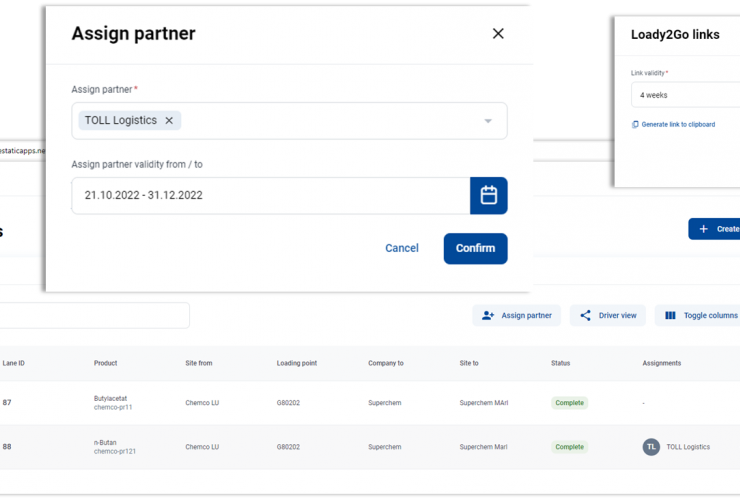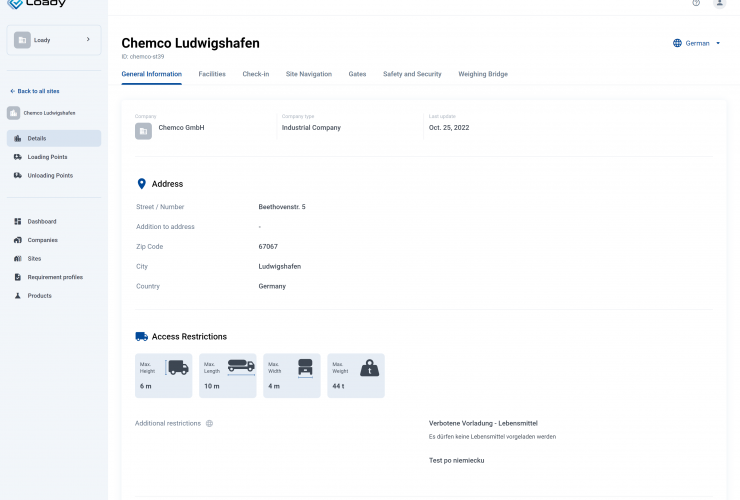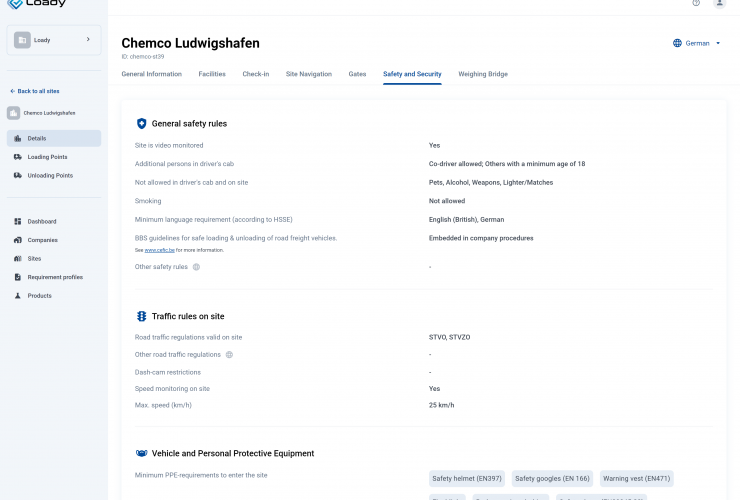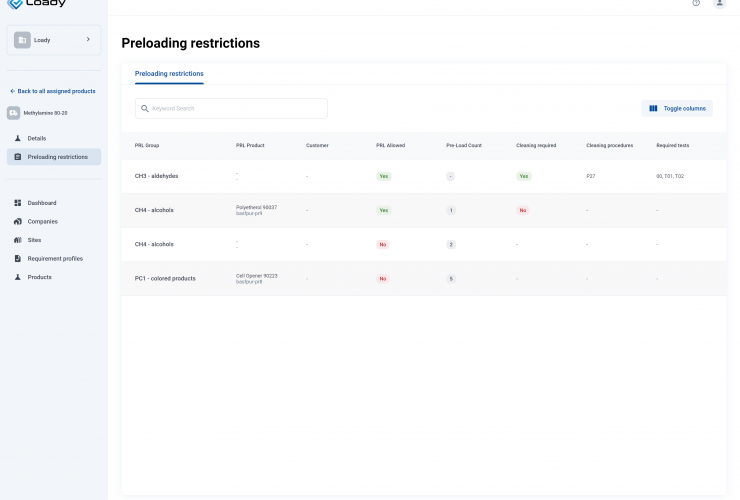IFOY Schirmherrschaft
IFOY Träger
IFOY Partner
Loady
Loady









IFOY-Kategorie
Start-up of the Year
Zusammenfassung
Loady stellt erstmalig standardisierte, verlässliche Anforderungen für das Be- und Entladen an Industriestandorten bereit. Lkw werden nicht mehr am Tor oder an der Ladestelle abgewiesen, denn mitzubringende Ausrüstung, Dokumente oder Abläufe vor Ort sind vorab korrekt und verständlich kommuniziert worden. Zuverlässige, planungssichere Transporte bedeuten auf Seiten der Industrie und der Logistikdienstleister Einsparungen in Millionenhöhe – und das ständige Troubleshooting auf allen Seiten entfällt. Loady ist grundlegend für die weitere Digitalisierung und Automatisierung der Logistik.
Beschreibung
Loady ist eine SaaS-Lösung und industrieweite Referenzquelle (Single Source of Truth) für Be- und Entladeanforderungen, auf die sich alle Logistikpartner in der Supply Chain beziehen können.
- Verlader und Warenempfänger können erstmalig alle Informationen und Anforderungen, die es für das Be- und Entladen eines Lkw an ihrem Standort und für bestimmte Produkte zu beachten gilt, in eine standardisierte Datenstruktur einpflegen.
- Loady beinhaltet ein modulares Datenmodell, dass für komplexe, große Standorte und Gefahrgüter, aber auch kleinere und einfachere Warenlieferungen nutzbar ist.
- Data Sharing: Über die Zuweisung von Transport-Lanes, können Daten mit Geschäfts- und Logistikpartnern für die jeweiligen operativen Prozesse geteilt werden.
- Datenänderungen werden in Loady getrackt, es gibt eine Datenhistorie. So ist jederzeit nachvollziehbar sein, welcher Datenstand zu welchem Zeitpunkt gültig war.
- Authorisierte Geschäfts- und Logistikpartner können bei Änderungen relevanter Datenfelder direkt informiert werden.
- Die Nutzung der Daten aus Loady erfolgt in den Unternehmensanwendungen via API, außerdem gibt es ein mobiles, multilinguales Interface für die Fahrer.
- Die Nutzung von Loady hilft im Frachteinkauf, Speditionsauftragswesen, Transportmanagement, Customer Service, Logistik- und Supply Chain Managment, der Standortlogistik und der Automatisierung / Digitalisierung von Logistikprozessen insgesamt.
- Bei den zur Datennutzung authorisierten Speditionen hilft Loady in der Ausschreibungsbearbeitung und Angebotserstellung, Disposition und der Kommunikation.
Bewerbungsdaten
Innovation
Es gibt keinen Vorgänger, nur eine langjährige Bruchstelle, die Loady endlich überwindet. Loady ist die erste Lösung am Markt, um Be- und Entladeanforderungen in einem strukturierten Datenmodell zu managen und eine verlässliche Quelle für alle Logistikpartner zu sein. Loady ist auch die erste zentrale Vorproduktdatenbank.
Damit bietet Loady eine sinnstiftende Alternative zu Freitextfeldern, in denen Unternehmen aktuell in unstrukturiertem Fließtextformat ihre Anforderungen zum Beladen – aber auch zum Entladen bei ihren Kunden – mühsam und fast immer fehlerhaft nachzuhalten versuchen. (Bei SAP geht es hier vor allem um die Felder G12 und G14 in den Speditionsaufträgen). Loady erstetzt auch manuell zusammengetragene Excel-Dateien für Logistiktender, Reinigungsanforderungen und Vorprodukte.
Marktrelevanz
Loady ist relevant für alle Unternehmen der Supply Chain und deren Logistikdienstleister, europaweit und global. Das bedeutet ein Marktvolumen von über 60.000 mittelgroßen bis großen Industrieunternehmen und über 20.000 Logistikdienstleistern weltweit. Durchschnittlichen Servicekosten liegen bei 20.000€ im Jahr, der potenzielle Markt bei 1.600 Millionen €.
Hauptvorteile für den Kunden
So profitieren Industrieunernehmen und Logistikdienstleister von Loady:
- Verlässliche Stammdaten, die entlang der Prozesse verwendet werden (teilweise auditrelevant).
- Klare Verantwortlichkeiten für relevante Informationen und hierfür etablierte Data-Management-Rollen mit klaren Data-Governance-Regeln.
- Vermeidung von europaweit zwei Millionen LKW-Ablehnungen an Toren und Lade-/Entladestellen.
- Vermeidung von 50 Millionen extra/Leerkilometern (~220t t CO2 Emissionen).
- Mehr Planungssicherheit an (Ent-)Ladestellen.
- Drastische Reduktion von aktuellen Aufwänden im Troubleshooting und der Ursachenklärung, im Pflegen und der gegenseitigen Verifizierung von Informationen.
- Automatische Kommunikation von relevanten Änderungen an Geschäfts- und Logistikpartner und damit gesteigerte Reaktionsfähigkeit und einheitliches Verständnis.
- Überwindung von Sprachbarrieren durch mehrsprachiges Interface mit direkter Übersetzung für Daten-Manager, Fahrer und Speditionen.
- Grundlegender Baustein zur weiteren Digitalisierung und Automatisierung der Logistik.
Technische Daten
Video: Recording of Loady GoLive V1 with live demo (to better understand how Loady works)
IFOY Test
| Name | Loady |
| Category | Start-up of the Year |
| Date of Test | 27.-30. März 2023 |
Testbericht
Loady ist eine Software as a Service (SaaS)-Lösung und industrieweite Referenzquelle (Single Source of Truth) für Be- und Entladeanforderungen, auf die sich alle Logistikpartner in der Supply Chain beziehen können. Verlader und Warenempfänger können erstmalig alle Informationen und Anforderungen, die es für das Be- und Entladen eines Lkw an ihrem Standort und für bestimmte Produkte zu beachten gilt, in eine standardisierte Datenstruktur einpflegen.
Die Software beinhaltet ein modulares Datenmodell, dass für komplexe, große Standorte und Gefahrgüter, aber auch kleinere und einfachere Warenlieferungen nutzbar ist. Über die Zuweisung von Transport-Lanes, lassen sich Daten mit Geschäfts- und Logistikpartnern für die jeweiligen operativen Prozesse teilen. Datenänderungen werden in der Software getrackt, es gibt eine Datenhistorie. So ist jederzeit nachvollziehbar sein, welcher Datenstand zu welchem Zeitpunkt gültig war. Autorisierte Geschäfts- und Logistikpartner können bei Änderungen relevanter Datenfelder direkt informiert werden. Die Nutzung der Daten findet in den Unternehmensanwendungen via API statt, außerdem gibt es ein mobiles, multilinguales Interface für die Fahrer.
Es gibt keinen Vorgänger, nur eine langjährige Bruchstelle, die sich mit der Software überwinden lässt. Loady ist die erste Lösung am Markt, um Be- und Entladeanforderungen in einem strukturierten Datenmodell zu managen und eine verlässliche Quelle für alle Logistikpartner zu sein. Bei der Software handelt es auch um die erste zentrale Vorproduktdatenbank.
Damit bietet Loady eine sinnstiftende Alternative zu Freitextfeldern, in denen Unternehmen aktuell im Fließtextformat ihre Anforderungen zum Beladen – aber auch zum Entladen bei ihren Kunden – mühsam und mitunter fehlerhaft nachzuhalten versuchen. In SAP geht es hier vor allem um die Felder G12 und G14 in den Speditionsaufträgen. Mithilfe der Software lassen sich ferner manuell zusammengetragene Excel-Dateien für Logistik-Tender, Reinigungsanforderungen und Vorprodukte ersetzen.
Loady ist relevant für alle Unternehmen der Supply Chain und deren Logistikdienstleister, europaweit und global. Das bedeutet ein Marktvolumen von über 60.000 mittelgroßen bis großen Industrieunternehmen und mehr als 20.000 Logistikdienstleistern weltweit.
IFOY Testfazit
Industrieunternehmen und Logistikdienstleister profitieren von Loady durch die Bereitstellung verlässlicher Stammdaten, die entlang der Prozesse verwendet werden. Die Verantwortlichkeiten für relevante Informationen sind eindeutig definiert. Hierfür sorgen etablierte Data-Management-Rollen mit klaren Data-Governance-Regeln. Demzufolge ist auch die Gefahr passé, dass Lkw an der Lade- oder Entladestelle abgewiesen werden. Somit trägt die Software zur Vermeidung von Extra- bzw. Leerkilometern bei (Reduzierung von Kohlendioxid-Emissionen). Der Aufwand für Problemlösungen, Ursachenklärung, Datenpflege und die gegenseitige Verifizierung von Informationen wird reduziert. Relevante Änderungen werden automatisch an Geschäfts- und Logistikpartner kommuniziert. Damit verbunden ist eine gesteigerte Reaktionsfähigkeit, was bei allen Beteiligten zu einem besseren Verständnis führt. Hierzu trägt auch die Überwindung von Sprachbarrieren durch mehrsprachiges Interface mit direkter Übersetzung für Daten-Manager, Fahrer und Speditionen bei.
IFOY Innovation Check
IFOY Innovation Check
Marktrelevanz
Das Produkt Loady von Chemovator (LOADY) adressiert die im Industrie- wie auch Handelsumfeld enorm wichtige Thematik des standardisierten Datenaustausches bei der Vergabe und Durchführung von Transportaufträgen im Speditionsumfeld. Damit stellt es „standardisierte und verlässliche Anforderungen für das Be- und Entladen an Industriestandorten bereit“ – ein zweifelsohne für eine extrem hohe Zahl von Unternehmen heute hochrelevantes Problem. Es gibt fast kein herstellendes Unternehmen oder Handelsunternehmen, das nicht von der Thematik betroffen ist.
Kundennutzen
Standardisierte Datenhaltung und -pflege sind bereits ein enormer Hebel zur Fehlervermeidung. Diese Daten werden dann ggf. auch automatisiert und standardisiert Fallabhängig ausgetauscht. Damit fallen signifikante Fehlerursachen weg und die Prozesssicherheit nimmt deutlich zu. Dies bietet nicht erst einen Vorteil, wenn alle Vertragspartner eines Vorganges das System nutzen, sondern bereits wenn einer der Vertragspartner es im Einsatz hat, werden erste wichtige Vorteile bereits nutzbar, durch die dann zwar als Freitext, aber dennoch strukturierte und standardisierte sowie vorher überprüfte zur Verfügungstellung der Daten.
Neuheit / Innovation
Das eigentlich weitreichend relevante Problem wurde bisher schlicht nicht angegangen, es handelt sich um die erste Lösung seiner Art. Noch nicht ganz geklärt ist das Marktverhalten hinsichtlich der Akzeptanz des Datenumgangs. Die Nutzbarkeit auf Basis unterschiedlicher Clients erlaubt eine schnelle Umsetzbarkeit und Akzeptanz des Produkts bei den Nutzern. Der Standard muss als solcher von den Verantwortlichen der Unternehmung angenommen werden.
Funktionalität / Art der Umsetzung
Das Produkt ist mit einer überzeugenden Architektur umgesetzt, die auch für die unterschiedlichen Nutzergruppen geeignete Clients mit einfach zu handhabenden Funktionalitäten bereitstellen. Besonders ist die Konzeption, die auch bei anfängliche wenigen Nutzern bereits einen signifikanten Vorteil umsetzbar macht. Damit ist eine mögliche erfolgreiche Umsetzung auch bereits in der Anfangsphase für einzelne Kunden rentabel – ein Thema, das leider bei vielen Produkten oft vernachlässigt wird.
Fazit
An der Schnittstelle zwischen Supply Chain und Intralogistik ist im Bereich der Verladung dieses Start-up positioniert. „Der zukünftige Standard“ (eigene Aussage) bietet eine strukturierte Verknüpfung von Daten, um den Gesamtprozess der Fracht von der Ausschreibung bis hin zur Rampenanfahrt zu optimieren. Dazu kommt eine Architektur der Applikationen bis hin zu einer App für den Fahrer. Die Herausforderung ist dabei, ob die vorgeschlagene Struktur auch wirklich als neuer Standard von den Stakeholdern angenommen wird. Das Produkt kann aber auch alleine funktionieren, ohne dass ein anderes Unternehmen angebunden ist und gibt dann die Daten als Freitext, aber in optimierter Struktur aus.
|
Marktrelevanz |
++ |
|
Kundennutzen |
++ |
|
Neuheit / Innovation |
+ |
|
Funktionalität / Art der Umsetzung |
+ |
|
++ sehr gut / + gut / Ø ausgeglichen / - weniger / -- nicht vorhanden |
|
Loady
Loady









IFOY category
Start-up of the Year
Summary
Loady provides standardized, reliable requirements for loading and unloading at industrial sites for the first time. Trucks are no longer rejected at gates or loading points, because equipment and document to be brought along or processes to be known are communicated reliably and comprehensibly. A higher planning acurracy of transport services means savings of millions of euro to the industry and logistics service providers – and the constant troubleshooting on all sides finally comes to an end. Loady is fundamental to further digitize and automatize logistics processes.
Description
Loady is a SaaS solution and industry-wide reference source (single source of truth) for loading and unloading requirements that all logistics partners in the supply chain can refer to.
- For the first time, shippers and customers can insert all relevant information and requirements for loading and unloading a truck at their location and for specific products into a standardized data structure.
- Loady includes a modular data model that can be used for complex, large sites and hazardous goods, as well as for smaller facilities and deliveries of simpler products.
- Data sharing: by assigning transport lanes, data can be shared with business and logistics partners for the respective operational processes.
- Data changes are tracked in Loady, there is a data history. It is always possible to know which information was valid at which point in time.
- Assigned business and logistics partners can be informed directly of changes to relevant data fields.
- The data from Loady can be used in company applications via API, additionally, there is a mobile, multilingual interface for drivers and carriers.
- Loady data is used in freight purchasing, forwarding order management, transport management, customer service, logistics and supply chain management, site logistics. Loady is a key enabler of further automation / digitalization of logistics processes
- Logistics service providers who are assigned to data sets in Loady can use the date in the processing of tenders and the preparation of offers, dispatching and the communication with subcontractors and drivers.
Entry Data
Innovation
There is no predecessor, only a decades old break point that is solved by Loady. Loady is the first solution on the market to maintain loading and unloading requirements in a structured data model and the first reliable source for all logistics partners. Loady is also the first central pre-product database.
Loady thus offers a meaningful alternative to free-text fields, where companies currently laboriously and almost always incorrectly try to maintain their requirements for loading at their sites - but also for unloading at their customers’ locations. Usually, this is done at the moment in unstructured continuous text format. E.g. in the case of SAP, this mainly involves the fields G12 and G14 in the forwarding orders. Loady also replaces manually compiled Excel files for logistics tenders, cleaning requirements and pre-product restrictions.
Marktet relevance
Loady is relevant for all companies in industrial supply chains and their logistics service providers, Europe-wide and globally. This means a market volume of more than 60,000 medium-sized to large industrial companies and more than 20,000 logistics service providers worldwide. Average service costs are €20,000 per year and the potential market is of €1,600 million.
Main customer benefits
This is how Industrial companies and logistics service providers benefit from Loady:
- Reliable master data on requirements along logistics processes (partially including audit-relevant information).
- Clear responsibilities for relevant information and data management roles established for this purpose with clear data governance rules.
- Avoidance of about two million truck rejections at gates and loading / unloading points across Europe.
- Avoidance of 50 million additional/empty truck kms (~220k t CO2 emissions).
- Improved planning accuracy at (un-)loading points.
- Drastic reduction of current efforts in troubleshooting and root cause analysis, maintenance and mutual verification of information.
- Reduced effort and time in tender management.
- Automatic communication of relevant changes to business and logistics partners and thus increased responsiveness and uniform understanding.
- Overcoming language barriers through multilingual interface with direct translation for data managers, drivers and carriers.
- Basic component to further digitize/automatize logistics.
Technical data
Video: Recording of Loady GoLive V1 with live demo (to better understand how Loady works)
IFOY Test
| Name | Loady |
| Category | Start-up of the Year |
| Date of Test | March 27 to March 30, 2023 |
Test Report
Loady is a Software as a Service (SaaS) solution and industry-wide reference source (single source of truth) for loading and unloading requirements that all logistics partners in the supply chain can refer to. For the first time, shippers and consignees can enter all the information and requirements that need to be considered for loading and unloading a truck at their location and for specific products into a standardized data structure.
The software includes a modular data model that can be used for complex, large sites and hazardous goods, as well as smaller and simpler goods deliveries. By assigning transport lanes, data can be shared with business and logistics partners for the respective operational processes. Data changes are tracked in the software, and there is a data history. This means that it is always possible to see which data status was valid at which point in time. Authorized business and logistics partners can be informed directly in the event of changes to relevant data fields. The data is used in the company applications via API, and there is also a mobile, multilingual interface for drivers.
There is no predecessor, just a long-standing breaking point that can be overcome with the software. Loady is the first solution on the market to manage loading and unloading requirements in a structured data model and be a reliable source for all logistics partners. The software is also the first centralized pre-product database.
Loady thus offers a meaningful alternative to free-text fields, in which companies currently try to track their requirements for loading, but also for unloading at their customers, in continuous text format, laboriously and sometimes incorrectly. In SAP, this mainly concerns the fields G12 and G14 in the forwarding orders. The software can also be used to replace manually compiled Excel files for logistics tenders, cleaning requirements and preliminary products.
Loady is relevant for all supply chain companies and their logistics service providers, Europe-wide and globally. This means a market volume of over 60,000 medium to large industrial companies and more than 20,000 logistics service providers worldwide.
IFOY test verdict
Industrial companies and logistics service providers benefit from Loady by providing reliable master data that is used along the processes. Responsibilities for relevant information are clearly defined. This is ensured by established data management roles with clear data governance rules. As a result, the risk of trucks being rejected at the loading or unloading point is also a thing of the past. In this way, the software helps to avoid extra or empty kilometers (reduction of carbon dioxide emissions). The effort required for problem solving, root cause clarification, data maintenance and mutual verification of information is reduced. Relevant changes are automatically communicated to business and logistics partners. This is associated with increased responsiveness, which leads to better understanding among all parties involved. Overcoming language barriers through a multilingual interface with direct translation for data managers, drivers and freight forwarders also contributes to this.
IFOY Innovation Check
IFOY Innovation Check
Market relevance
Chemovator's (LOADY) product named Loady product addresses the enormously important issue of standardized data exchange in the awarding and execution of transport orders in the forwarding environment, both in the industrial and the commercial environment. It thus provides “standardized and reliable requirements for loading and unloading at industrial sites” - undoubtedly a highly relevant problem for an extremely high number of companies today. There is almost no manufacturing company or trading company that is not affected by the issue.
Customer benefit
Standardized data storage and maintenance are already an enormous lever for error prevention. If necessary, this data is then also exchanged automatically and standardized on a case-dependent basis. This eliminates significant causes of errors and significantly increases process reliability. This does not only offer an advantage when all contractual partners of a process use the system, but already when one of the contractual partners has it in use, the first important advantages already become usable, through the then as free text, but nevertheless structured and standardized as well as previously checked provision of the data.
Novelty /Innovation
The problem, which is actually of far-reaching relevance, has simply not been addressed to date; it is the first solution of its kind. The market behavior regarding the acceptance of data handling has not yet been fully clarified. The usability on the basis of different clients allows the product to be quickly implemented and accepted by users. The standard must be accepted as such by those responsible for the company.
Functionality / Type of implementation
The product is implemented with a convincing architecture, which also provides suitable clients with easy-to-use functionalities for the different user groups. Particularly is the conception, which already makes a significant advantage convertible also with initial few users. This makes a possible successful implementation profitable even in the initial phase for individual customers - a topic that is unfortunately often neglected in many products.
Verdict
At the interface between supply chain and intralogistics, this start-up is positioned in the area of loading. “The future standard” (own statement) offers a structured linking of data to optimize the overall process of freight from tendering to ramp approach. In addition, there is an architecture of applications up to an app for the driver. The challenge here is whether the proposed structure will actually be accepted as a new standard by stakeholders. However, the product can also function on its own, without another company being connected, and then outputs the data as free text, but in an optimized structure.
|
Market relevance |
++ |
|
Customer benefit |
++ |
|
Novelty / Innovation |
+ |
|
Functionality / Type of implementation |
+ |
|
++ very good / + good / Ø balanced / - less / -- not present |
|













